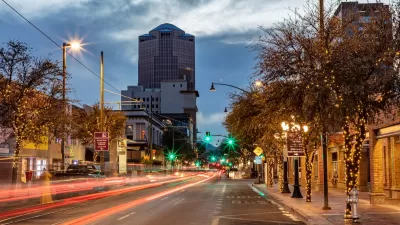For parents of small children, amenities like public restrooms or shady parks can vastly improve—or deteriorate—the experience of navigating cities.

Writing in Streetsblog USA, Barry Greene Jr. outlines five ways that the built environment fails families with young children.
The first problem, Greene writes, is shade. For example: in the warm, humid climate of Greenville, South Carolina, a new city park fails to provide almost any shade. Greene writes that parents and children need shady spots to rest during an outing.
The second issue, for Greene, is public restrooms. Most U.S. cities famously lack a robust network of public bathroom facilities, often turning a walk around a city into an urgent hunt for a bathroom. For parents of toddlers, this is another way their needs are excluded from the public built environment. “Cities are so afraid of our housing insecure that we’ve simply made it inhumane to use the bathroom. Children can’t wait — and sometimes, neither can adults.”
Greene also laments the lack of pedestrianized streets, which create safe spaces for children to run and play, as well as small-scale shops and “micro-retail storefronts” that let parents quickly access daily needs.
Greene’s fifth element of public life that doesn’t cater to parents and children is public transit. “I’ll also include family-friendly ridesharing. Currently, there’s no way to request a rideshare with a child car seat.”
Ultimately, Greene’s advice, aimed at designing cities with children in mind, can make public spaces more safe, pleasant, and accessible to all groups.
FULL STORY: Five Things Missing In The Built Environment For Families With Young Children

Maui's Vacation Rental Debate Turns Ugly
Verbal attacks, misinformation campaigns and fistfights plague a high-stakes debate to convert thousands of vacation rentals into long-term housing.

Planetizen Federal Action Tracker
A weekly monitor of how Trump’s orders and actions are impacting planners and planning in America.

San Francisco Suspends Traffic Calming Amidst Record Deaths
Citing “a challenging fiscal landscape,” the city will cease the program on the heels of 42 traffic deaths, including 24 pedestrians.

Defunct Pittsburgh Power Plant to Become Residential Tower
A decommissioned steam heat plant will be redeveloped into almost 100 affordable housing units.

Trump Prompts Restructuring of Transportation Research Board in “Unprecedented Overreach”
The TRB has eliminated more than half of its committees including those focused on climate, equity, and cities.

Amtrak Rolls Out New Orleans to Alabama “Mardi Gras” Train
The new service will operate morning and evening departures between Mobile and New Orleans.
Urban Design for Planners 1: Software Tools
This six-course series explores essential urban design concepts using open source software and equips planners with the tools they need to participate fully in the urban design process.
Planning for Universal Design
Learn the tools for implementing Universal Design in planning regulations.
Heyer Gruel & Associates PA
JM Goldson LLC
Custer County Colorado
City of Camden Redevelopment Agency
City of Astoria
Transportation Research & Education Center (TREC) at Portland State University
Jefferson Parish Government
Camden Redevelopment Agency
City of Claremont





























